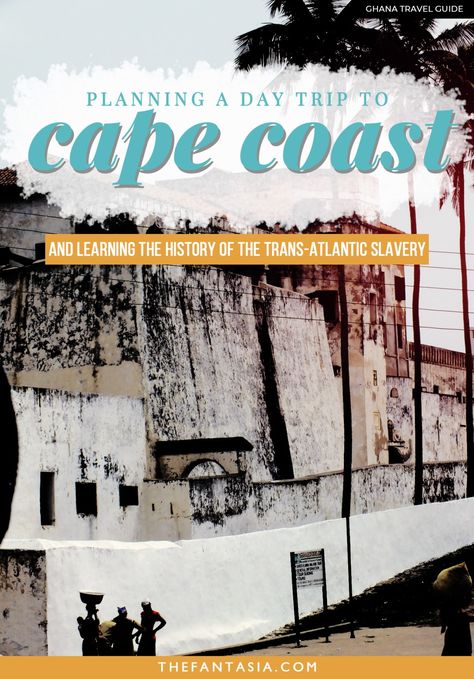 Before my trip in Ghana came to an end, I decided to visit a historic site in the country called Cape Coast. Although the city itself is known for its fishing trade, it was also home to the infamous Cape Coast Castle, better known as the “slave castle”. Sadly Cape Coast Castle was only one of the many forts dedicated to slave trade that dotted the entire Gold Coast region (areas that were part of the British colony) back in the 1700-1800.
Before my trip in Ghana came to an end, I decided to visit a historic site in the country called Cape Coast. Although the city itself is known for its fishing trade, it was also home to the infamous Cape Coast Castle, better known as the “slave castle”. Sadly Cape Coast Castle was only one of the many forts dedicated to slave trade that dotted the entire Gold Coast region (areas that were part of the British colony) back in the 1700-1800.
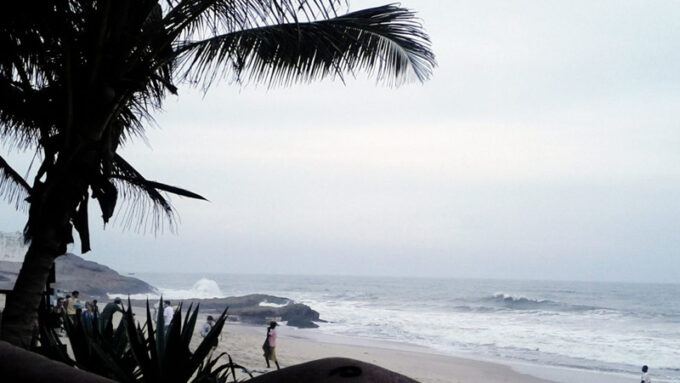
A Brief History of Cape Coast
Cape Coast Castle was not originally built to serve the trans-Atlantic slave trade – it served as a commercial post for gold and timber trade between the Europeans and local population. When it was turned into a slave trade post, everything about the castle change. Inside, the filthy, cramped and squalid dungeon housed slaves prior to their journey whilst the comfortable upper levels were reserved for the colonists. Due to its strategic location in Cape Coast, it is usually the last stop (i.e. from other areas of Africa) prior to departing for the Americas or Europe. As a result it earned the name “gate of no return”.
Read More: Day Trip to Busua Beach in Ghana.
Today, Cape Coast is home to a lively town and is one of Ghana’s popular tourist site. Supposedly, Michelle Obama considers Cape Coast as her ancestral home and in 2009, the First Family took a tour of Cape Coast. If you are interested in learning more about Cape Coast and the slave trade, I highly recommend a reading the novel Homegoing by Yaa Gyasi ($32, available here) which was released a few years ago. It is a story about two Assante sisters who led vastly different lives despite being from the same family: one lives comfortably as the wife of the British governor and the other as a slave in the dungeon. The story chronicles their stories and their descendants. It has 84% rating and a 4.4/5 rating on Goodreads, so definitely check it out if you are interested.
As a travel blogger, I chose not to take pictures of the site out of respect for those who suffered here. I hope you understand why!
I did a brief reading on Cape Coast before heading there but never truly understood the significance of it. At the time, we felt (childishly, I admit) that it was just another historic site located in front of a lovely beach. This oversight remains one of my biggest regrets – I didn’t give it the attention, and respect that it deserved. It’s almost like visiting the Memorial to the Murdered Jews of Europe in Berlin without reading about the Holocaust.
The Cape Coast beach itself is a vastly more popular tourist destination compared to Busua Beach and is a major tourist attraction. A short drive from Cape Coast is the Kakum National Park, one of the best-preserved rainforest in the region with a canopy trail that gives you a better view of the entire park. You can read more on how to get here from Cape Coast on the Wikitravel site.
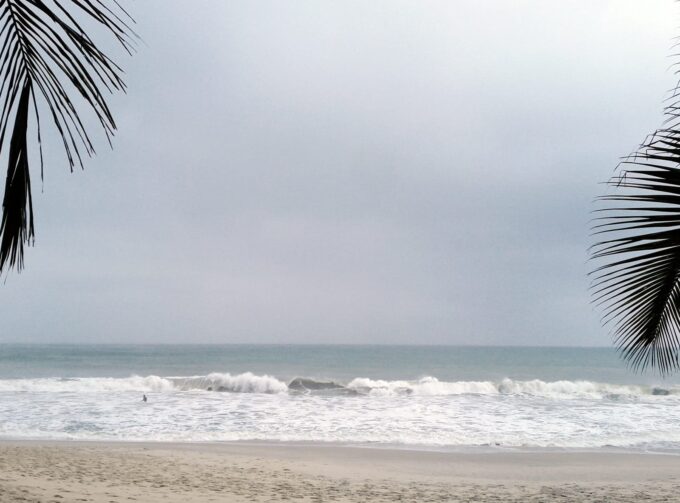
Exploring Cape Coast: Beach, Castle, and Town
I stayed in Cape Coast for several days with my friends. Since we “roughed it out” last time in Busua Beach, we chose a more luxurious place to stay (luxurious defined by our backpackers’ budget). We opted to stay in the quirky Oasis Beach Resort with its quaint little huts. It was a combination of hostel and hotel but we opted for a more hostel experience – We chose the 3-bed shared basic room (with a fan instead of AC and a wash basin inside the hut) and shared the toilets and showers facilities. It was $40/night shared between three people so highly affordable for what it was.
I found staying in a little hut to be enjoyable and something interesting to bring up when talking about your travels. There’s a mosquito net over each bed so you can rest comfortably knowing that there’s some mosquito protection.
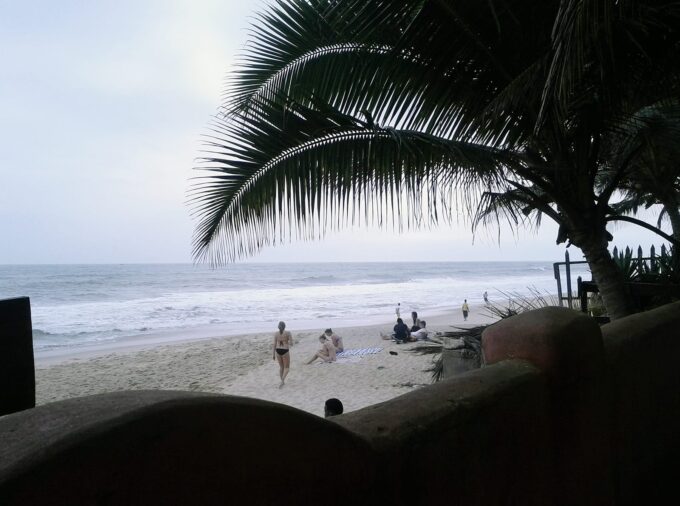
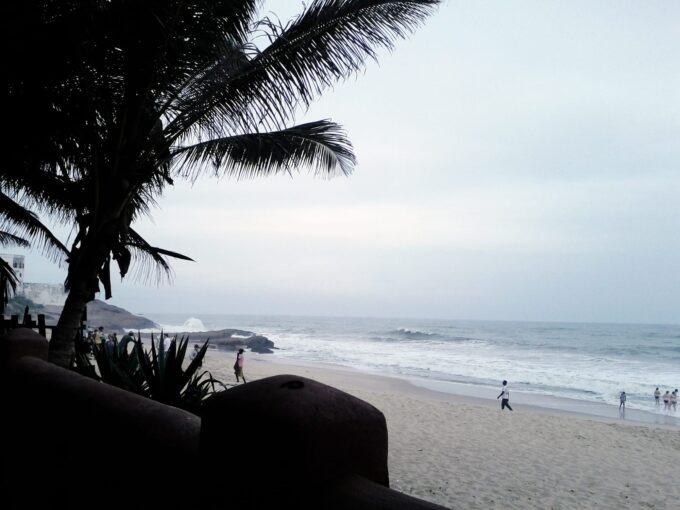
Whilst there, we heard tons of recommendations about Baobab Guesthouse and their spectacular vegetarian Ghanaian food. Most travellers know that finding food that adheres to specific dietary restrictions can be tough in certain parts of the world, so we certainly weren’t expecting a vegetarian-friendly restaurant at all!
Out of curiosity, we obviously had to check it out – we ended up staying for a delicious breakfast, and learning about this incredible non-profit guesthouse! In addition to running as a guesthouse, it offers a variety of skill-building classes, activities and sells handmade curio and local produce with all proceeds going to running the Baobab school. The school which helps local children to go to school, build a trade, and provide them with resources as well.
I ended up having their hot chocolate and pancake. They make their hot chocolate with locally sourced cocoa beans (that’s as authentic of a hot chocolate as you’re going to get!) and had to bring a pack home so I can make them at home. They also make fresh honey and I brought a jar home as well.
What You Need to Know
- Getting In: I spent almost two months working in Ghana with 2 female colleagues. The country is considered one of the safer countries in Africa, and is fondly known as the Gateway to Africa. Still check your country’s official travel advisory site for up to date information
- Currency: Ghana’s currency is the Ghanaian cedi (GHc) which equates to GHc3.5 = CAD$1. There are a number of bank branches in the major cities (Barclays and Lloyds, which are popular UK banks) but be sure to bring cash as much as you can. Most vendors value cash over cards for obvious reasons.
- Getting Around: Taxis are the most common mode of transportation. It’s cheap too. Make sure to bargain your fare before getting in as there is no meter. For day trips, tro-tro (local minibuses) are also a good (and very cheap) option.
- Local Lager: Try the local lager, “Star” where you can. Very inexpensive so you can drink to your heart’s content
- Food: Local food is very much carb-heavy featuring rice, yams, potatoes and cassava made into local delicacies. Try Jollof rice (I like to describe it as a variation of fried rice), and if you’re brave, banku or fufu (which comes with a side of paste of cassava and corn that is incredibly filling – my two friends and I attempted to finish 1 dish, shared between us three, and could not even conquer half). My favourite dish is waakye which comes with a side of shiito that makes everything taste so much better!
- Where to Go: Accra is the capital city, very much a place to check out. Cape Coast has a lot of history while Takoradi is a developing city that’s seeing more and more expats
- Important to know: Entry to Ghana requires proof of yellow fever vaccination. You will be denied entry if you don’t have proof
- Staying Connected: Vodafone is a local carrier in the region; it’s very cheap, quick and easy to get set up with a SIM card and a pay-as-you-go plan.
Would you visit Cape Coast?
